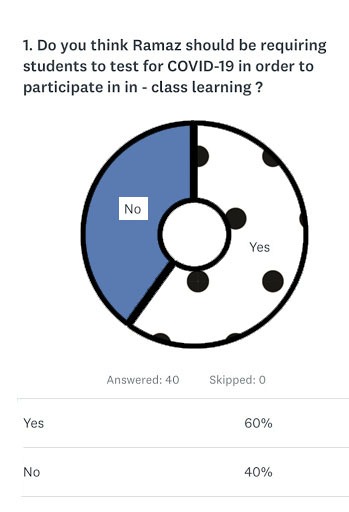To Test or Not to Test

With the reopening of schools for the 2020-2021 academic year, many schools who have opted for in-person learning find themselves conflicted with the following question: to test or not to test for Covid-19?
A large number of Jewish high schools, including Frisch and HAFTR, chose to test students and faculty prior to the reopening of school in September. Fortune 500 companies, like Amazon and Apple, continually screen employees for corona in order to ensure maximum safety measures. New York City public schools conduct random surveillance testing on a percentage of their population when the school buildings are open. However, other institutions decided not to require a negative Covid-19 test from students and faculty before opening their doors. Ramaz is in the latter category. The real question is: What ultimately drew the administration to this decision, and how does the student body feel about it?
Rabbi Stochel provided much insight into the rationale behind the school’s decision not to test. According to him, the school’s health committee was behind most of the decision making and recommended against testing for a few reasons. First, he said that tests are “only good for that moment in time,” meaning that if a student tests negative on a Tuesday, the student could contract the virus on Wednesday or at any subsequent point following the last negative test. Second, a negative testing test could give people a false sense of security against the virus, and discourage the need for other safety precautions. And finally, while positive results will prevent some people from coming to school and potentially spreading Covid-19, the larger problem of ensuring the entire school stays healthy, remains unsolved. Instead of testing, the health committee for Ramaz recommended the Magnus App, which every student is now required to complete each morning before he or she enters the school building.
While Ramaz did not require negative corona tests before returning to school, there is still a question about whether the school should implement surveillance, meaning randomized testing. According to Rabbi Stochel, the administration is still exploring that possibility, and will readdress the matter in the future. However, no further changes in the school’s testing policy seem to have been made yet.
Many students feel that the school should have taken extra precaution by testing, and some agree with the school that testing would have had no positive effects. A poll sent out to all four grades holds that 60% of students think that Ramaz should require students to test for Covid-19 in order to attend in-person learning, while the other 40% do not. Regarding the senior and junior grades having to learn from home for the crucial first two weeks of school due to multiple Covid cases, Emily Rosenfeld’ 22 said, “If the school tested before the students entered the building, they probably would have caught some positive cases and that therefore would have limited our exposure to the virus.” On the other hand, Caleb Rosenfeld ’22 argued, “Covid testing only captures that one moment in time and who knows if a particular student would be exposed to the virus after their negative test. It would ultimately give students a false sense of security.” Emily also voiced her opinion on the possibility of having frequent surveillance testing. She believes, “[Random testing] would make students and parents more cautious, as they would fear not being able to attend school if their results came back positive.”
Fighting Covid-19 requires a multi-layered defense. Although the school chose not to require students to have a negative test before reentering the building, many students do believe that it is a valuable tool to utilize in order to help keep the Ramaz community safe.


